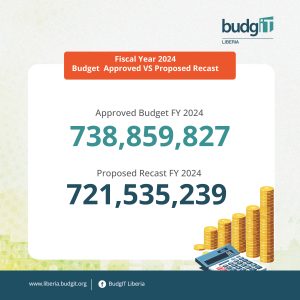 President Boakai has submitted a proposed recast budget of US$721.5 million to the National Legislature, which indicates a projected revenue decline of US$17.3 million (a 2.3% decrease) and a US$48 million austerity measure. This amended budget comes after the Boakai-Koung administration presented a revised post-election draft budget of US$692.41 million to the 55th National Legislature on March 14, 2024. After thorough deliberation, the Legislature adjusted the budget upward, passing a law approving a US$738.86 million budget for Fiscal Year 2024.
President Boakai has submitted a proposed recast budget of US$721.5 million to the National Legislature, which indicates a projected revenue decline of US$17.3 million (a 2.3% decrease) and a US$48 million austerity measure. This amended budget comes after the Boakai-Koung administration presented a revised post-election draft budget of US$692.41 million to the 55th National Legislature on March 14, 2024. After thorough deliberation, the Legislature adjusted the budget upward, passing a law approving a US$738.86 million budget for Fiscal Year 2024.
Despite multiple alterations to the national budget, the President has summoned the National Legislature back from its break to deliberate on the proposed recast budget, which ran from August 29 to September 19, 2024. The government is proposing a 91.4 percent increase in recurrent expenditure from US$643.7 million to US$659.4 million despite the projected revenue decline in the proposed recast. Meanwhile, the Public Sector Investment Plan allocation has dropped significantly, from US$95.1 million to US$62.1 million, accounting for 8.6% of the recast budget.
The following sectors experienced slight budget cuts:
The Health sector budget will be reduced from US$80.1 million to US$78.9 million, a 1.5% decline compared to the approved budget, representing 10.9% of the recast budget.
Similarly, the Education sector will see a reduction from US$111.3 million to US$108.4 million, a 2.6% decrease compared to the approved budget, accounting for 15% of the total recast budget.
The Agriculture sector will follow a similar trend, with its budget decreasing from US$8.8 million to US$6.7 million, a 23.9% decline, representing 0.93% of the total recast budget.
How will the 2024 budget revisions affect the 2025 budget?
The 2025 Budget Preparation Calendar states that the draft budget must be submitted by October 31. However, given the current focus on the recast budget and delays in pre-budget consultations, it is increasingly evident that the 2025 budget submission will likely be delayed.
Recent trends on budget submission in Liberia also indicate that the 2025 budget will likely face significant delays. In 2023, the draft budget was submitted on December 6, 2022, by the Ministry of Finance and Development Planning (MFDP), proposing a budget of US$777.94 million. This submission was delayed, which led to a delay in its passage. Section 11.1 of the 2009 Public Financial Management Act (as amended) states, “The President shall submit the Proposed Budget and accompanying documents to the Legislature no later than two months before the start of the fiscal year.”
Similarly, on December 19, 2023, the outgoing Weah-Taylor administration submitted the draft budget for the fiscal year 2024, proposing US$625.57 million. Due to its late submission, the 54th Legislature could not act on it, and it was passed on to the incoming 55th Legislature. On January 26, 2024, the 55th Legislature returned the budget to the executive for alignment with the new Boakai-Koung administration’s agenda. Subsequently, on March 14, 2024, the Boakai administration submitted its first draft national budget for fiscal year 2024, totaling US$692.4 million, to the House of Parliament. The 2024 Approved Budget, valued at US$738.86 million, was signed into law on May 15, 2024, by President Boakai. However, based on the revenue performance since the beginning of the fiscal year, the executive branch proposed a recast budget of US$721.5 million—reflecting a 2.3% decrease.
The Impact of delayed budget passage on Liberia’s economy
Liberia’s economic activity is significantly influenced by government spending, and budget delays have adverse economic repercussions on the well-being of citizens, business activities, foreign investments, and government operations. Section 17.1 of the Public Financial Management Act provides that if the Legislature fails to approve the National Budget before the start of the fiscal year, the Minister of Finance is authorized to collect revenues and approve expenditures in line with the proposed budget, up to one-twelfth (1/12) of the previous fiscal year’s budget. During this period, however, the government cannot award contracts, procure goods, or finance capital projects—limiting economic activity and exacerbating constraints for businesses and individuals, given that the government is the largest spender in Liberia’s economy.
Concluding thoughts on delayed budget and sectoral cuts
The government must prioritize an efficient and timely budget process if it is committed to stabilizing Liberia’s fragile economy. The national budget drives economic growth, supports public services, and builds trust in government institutions. The Boakai-Young administration should learn from the previous administration and focus on managing the budget effectively to ensure the economy is on a positive trajectory.
We have seen several cuts to sectoral allocations that directly impact the welfare of citizens, while allocations to the Public Administration sector have increased from US$256.7 million to US$266.6 million—a 3.7% rise that now accounts for 36.9% of the total recast budget. Similarly, the budget for the Legislature is projected to rise from US$53.4 million to US$57.9 million, and employee compensation is set to increase from US$298.7 million to US$301.9 million, representing 41.8% of the recast budget.
To demonstrate a commitment to citizens’ well-being, the Boakai-Young administration must work to reduce the cost of governance and reallocate resources toward social welfare programs and other critical sectors that directly benefit the people. This approach will ensure that the government’s fiscal decisions align with the needs and priorities of its citizens, increasing their trust in the government and ensuring broader economic and social stability.